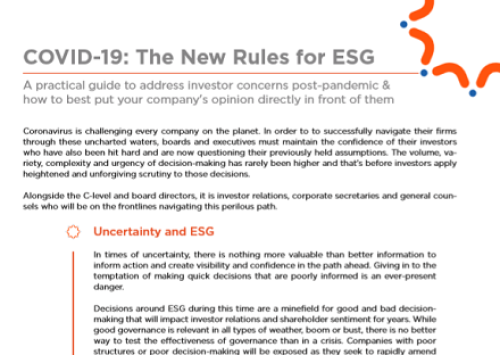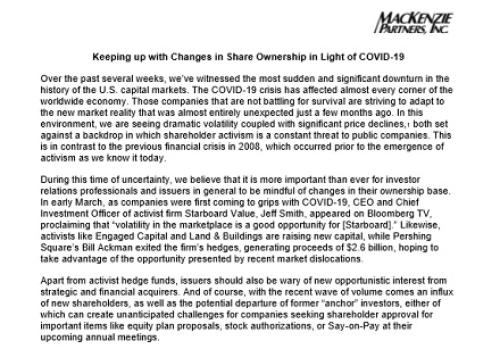UK regulator the Financial Reporting Council (FRC) has advised British companies to outline the full extent of the risk posed by the new coronavirus, as companies around the world issue warnings about the virus’ potential impact on their quarterly earnings.
The FRC recommends that UK firms with operations or manufacturing in China disclose the extent of risk to their business and the quantifiable impact on their year-end reports, as the accounting year ends on April 5 in the UK.
The regulator's call is also relevant for companies that are dependent on supply chains in, or have close trading associations with, China. UK companies are encouraged to report on actions taken to mitigate the risk and uncertainties caused by such issues as staff shortages and production delays.
‘Given the potential for rapid spreading of the virus, required disclosures will likely change over time as more information about the epidemic emerges,’ says the FRC’s statement. 'As a result, companies will need to monitor developments and ensure they are providing up-to-date and meaningful disclosure when preparing their year-end reports.’
Coronavirus derails tech giant’s revenue goals
The regulator’s recommendations come after Apple issued a revenue warning on Monday saying the tech giant is set to miss its second-quarter financial guidance.
‘Work is starting to resume around the country, but we are experiencing a slower return to normal conditions than we had anticipated,’ says the tech company statement. ‘As a result, we do not expect to meet the revenue guidance we provided for the March quarter due to two main factors.’
These factors are a slowed or halted production in its Chinese manufacturing site located outside Hubei province and a drifting demand for iPhones in its greatest market. Due to the coronavirus outbreak, ‘all of our stores in China and many of our partner stores have been closed,’ the company release explains.
Gauging impact in the US and EU
The new coronavirus outbreak has hit numerous companies worldwide. French electrical equipment group Schneider Electric has warned that the virus has inflicted a €300 mn ($324 mn) hit on its revenues this quarter, the Financial Times reported on Thursday.
As the virus eats into sales, several US companies with a presence in mainland China have also adjusted their expected quarterly earnings. KFC owner Yum Brands has braced itself for a prolonged negative impact on its quarterly earnings, stretching beyond the first financial quarter.
The US group, which also owns Pizza Hut and Taco Bell fast-food restaurants, along with its largest master franchisee, Yum China, is ‘significantly impacted’ by the outbreak of the coronavirus, which has resulted in many of these locations being temporarily closed or having their operating hours shortened in mainland China, notes the FT.
According to MarketWatch, Capri Holdings, owner of luxury brands such as Jimmy Choo and Versace, expects annual revenue of $5.65 bn, which is below its previously forecast figure of $5.78 bn.
SEC fraud alert for investors
In a separate development, the SEC has released guidance for investors to be wary of fraudsters looking to take advantage of the coronavirus outbreak.
The latest and emerging scam targets investors in particular. Fraudsters suggest that a company’s products or services will be used to help stop the coronavirus outbreak, the SEC warns in its guidance.
These claims are potentially made as part of fraudulent ‘pump-and-dump’ schemes, notes the commission, explaining that the scheme tries to ‘pump up’ or increase the stock price of a company by spreading positive but often false rumors, prompting many investors to purchase the stock. Then the fraudsters quickly ‘dump’ their shares before the hype ends.
The SEC has warned that these scams are most likely to involve micro--cap stocks. Spreading false statements on micro-caps stocks is favored by investment scam artists as there is often limited publicly available information about micro-cap companies’ management, products, services and finances.










